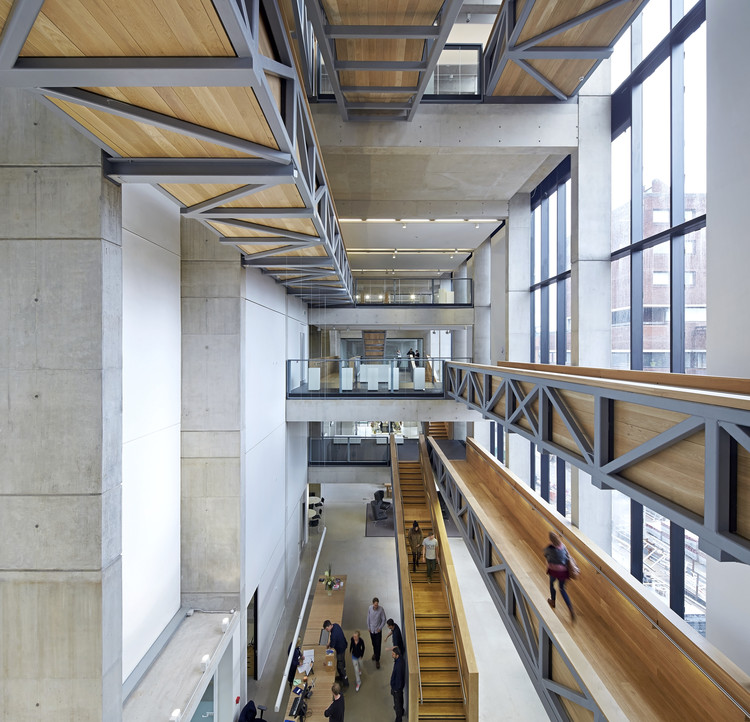
-
Architects: Feilden Clegg Bradley Studios
- Area: 17320 m²
- Year: 2013
-
Photographs:Hufton+Crow
-
Manufacturers: Troldtekt, Steel Color

Text description provided by the architects. Context: Celebrating its 175th birthday in 2013, Manchester School of Art is one of the oldest institutions of its kind in the UK. The school was established in the 19th Century to help keep the region competitive in an international market and support regional industry in a wider marketplace.

Now a faculty of Manchester Metropolitan University this remains an important objective for the Art school and a key part of the brief was to help the school bridge the gap between education and professional life.

The new building celebrates the inter relation of the various art & design disciplines and encourages 21st century students to work alongside each other and enjoy the crossover rather than concentrating always on the differences. With a huge front window, it is also a building that is proud of its product and shows the work to everyone who passes by.

Now one of the leading Art & Design courses in the country, the School has around 3500 FTE students across its various disciplines. Housed within a range of late Victorian and post-war buildings, the School forms the southern edge of All Saints’ Park, a green square at the heart of the city centre campus. The Art School Extension consists of an 8600m2 new building of studios, workshops and a gallery; and a 9000m2 refurbishment of a 1960s Arts tower and plinth.

Concept: FCB’s design of the Manchester School of Art has provided an engaging and lively environment in which to work and study and helped re-assert both the art school and the university’s profile on the national stage. The Dean of the School, Professor David Crow, describes the scheme as “a hugely exciting arena where anything is possible and everything is relevant.”

The working heart of the building comprises open studios, workshops and teaching spaces (known as the Design Shed.) A second element is a seven storey ‘Vertical Gallery’. This is the linking piece between the existing 1960s arts tower (known as the Chatham Building) and the new studio building. This vertical gallery provides a showcase space for the output of the School and acts as a shop window to the school itself.

Hybrid Studio Space: The open studio space places a great focus on collaborative working in an atmosphere that is inherently creative. Students and MSA staff from a broad spectrum of contemporary design disciplines can work on projects in close communal proximity.

This proximity encourages the sharing of ideas, techniques and methodologies in a way that was previously impossible. The Hybrid Studio is also an environment in which students can proudly display their work in a setting that is light and easy to explore.

Materials: As a building for designers, and a place for teaching and learning about Art & Design the clarity and articulation of materials was crucial, as was the tonal and textural quality of the interior. The interiors are a study in concrete, with three distinct grades creating different atmospheres.

Rough is used in back stairwells giving a sense of rawness and a factory aesthetic; double height cast concrete columns articulate the central spaces of the design shed, punctuated by four very special decorative concrete columns which were developed from an early 20th century wallpaper design by Lewis F Day, an eminent designer of his period, contemporary of Walter Crane a tutor at Manchester School of Art.

A secondary but important material is the use of oak linings to the stairs and linking corridors which span the vertical gallery. These provide a warmth to soften the hard edges of steel and concrete which form the structure.

Collaboration: Working with clients who are artists and designers on a building for training artists & designers was a wonderfully rich experience for us. The level of collaboration was exceptionally high and we worked with the client by testing processes, recrafting ideas and always seeing the design as an iterative, creative process.




































